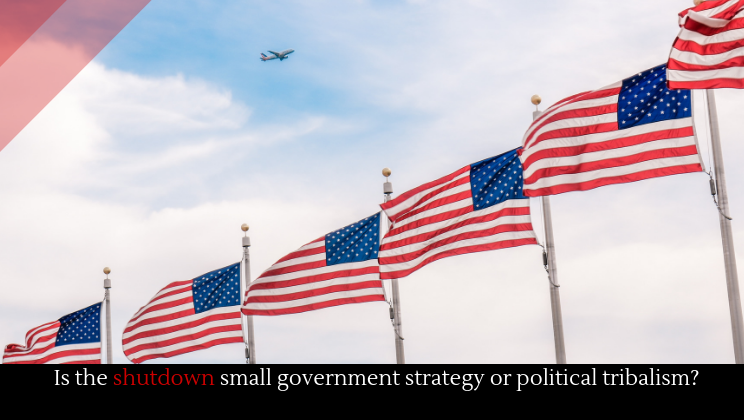Is the shutdown small government strategy or political tribalism?
Posted by Josh Taylor / January 15, 2019
The government shutdown is now the longest shutdown in United States history, and it shows no sign of ending. Recently, according to the New York Times, Trump rejected a temporary end to the shutdown:
In an appearance on Fox News Sunday, Mr. Graham, a close ally of the president, pitched Mr. Trump on a plan for the president to agree to a vote by Congress to reopen the government for about three weeks “before he pulls the plug on the legislative option.” If there was no progress made during that time, Mr. Graham said, the president could then declare a national emergency as a way to obtain funding for a border wall without congressional action.
Trump rejected the plan. This begs the question, what’s at the root of the shutdown? One Psychology Today author believes it might be political tribalism:
Part of group-centrism is also a shifting down to more simplistic thinking including either-or thinking, as in you’re either with us or against us. You’re either for the wall or for open borders. The zero-sum game that the shutdown crisis has become is a further example of this cognitive shutdown. I get that politics can unfold this way, which can help win elections, but as articulated in the is-ought fallacy, just because something is a certain way doesn’t mean it ought to be.
Or is it something more sinister? According to a senior Trump official, the prolonged shutdown is a way to cull the government payroll:
Federal employees are starting to feel the strain of the shutdown. I am one of them. But for the sake of our nation, I hope it lasts a very long time, till the government is changed and can never return to its previous form.
[…]
On an average day, roughly 15 percent of the employees around me are exceptional patriots serving their country. I wish I could give competitive salaries to them and no one else. But 80 percent feel no pressure to produce results. If they don’t feel like doing what they are told, they don’t.
Why would they? We can’t fire them. They avoid attention, plan their weekend, schedule vacation, their second job, their next position — some do this in the same position for more than a decade.
More politics.
Comments are off for this post.